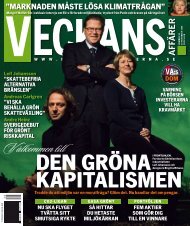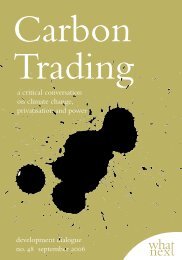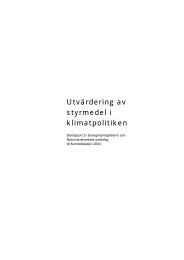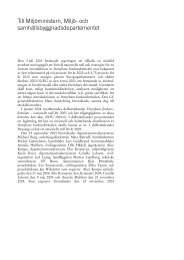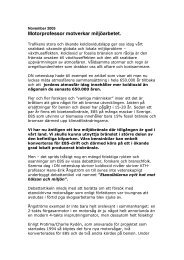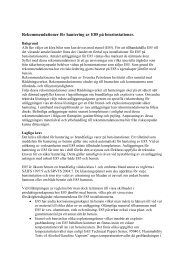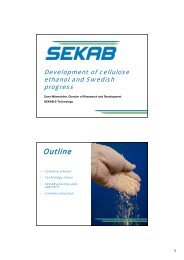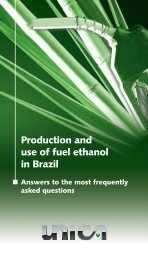Sugarcane ethanol: Contributions to climate change - BAFF
Sugarcane ethanol: Contributions to climate change - BAFF
Sugarcane ethanol: Contributions to climate change - BAFF
Create successful ePaper yourself
Turn your PDF publications into a flip-book with our unique Google optimized e-Paper software.
Chapter 9<br />
also risks and serious trade-o�s over food security, small farmers inclusion, environment<br />
and the economy.<br />
Much of the available evidence comes from Brazil, which has the main longstanding<br />
experience with the launching of the PROALCOOL Programme in 1975 <strong>to</strong> replace<br />
imported gasoline with bio<strong>ethanol</strong> produced from locally grown sugarcane. Today Brazil is<br />
the second bio<strong>ethanol</strong> producer a�er the United States and the main exporter. In addition,<br />
there have been other smaller initiatives with di�erent rate of success. �ese include<br />
African and East Asian countries such as Zimbabwe, Malawi, Kenya, Pakistan and India<br />
that have promoted bio<strong>ethanol</strong> from sugarcane molasses, some of them since the early<br />
eighties. More widely, at present, many countries around the world, in their search for<br />
development and poverty reduction opportunities are trying <strong>to</strong> replicate the Brazilian<br />
experience with sugarcane bio<strong>ethanol</strong>. �eir vast majority are developing countries in<br />
tropical and semitropical areas in the Caribbean, Africa, Latin America and East Asia in<br />
which sugarcane is traditionally grown.<br />
�e chapter is organized as follows. A�er this brief introduction, Section 2 argues that<br />
sugarcane bio<strong>ethanol</strong> may o�er some genuine opportunities for sustainable development<br />
and poverty reduction and identify the key potential bene�ts. Section 3 points out that<br />
bene�ts are not straightforward and identi�es several challenges and trade-o�s that need <strong>to</strong><br />
be confronted in order <strong>to</strong> realize their full potential for achieving sustainable development<br />
and poverty reduction. Finally, section 4 concludes and provides some recommendations.<br />
2. Opportunities for sugarcane bio<strong>ethanol</strong> in achieving sustainable<br />
development and the Millennium Development Goals<br />
<strong>Sugarcane</strong> bio<strong>ethanol</strong> can contribute <strong>to</strong> sustainable development and poverty reduction<br />
through a varied range of environmental, social and economic advantages over fossil fuels.<br />
�ese include: (a) enhanced energy security both at national and local level; (b) improved<br />
social well-being through better energy services especially among the poorest; (c) improved<br />
trade balance by reducing oil imports; (d) rural development and better livelihoods; (e)<br />
product diversi�cation leaving countries better-o� <strong>to</strong> deal with market �uctuations; (f)<br />
creation of new exports opportunities; (g) potential <strong>to</strong> help tackling <strong>climate</strong> <strong>change</strong> through<br />
reduced emissions of greenhouse gases (h) reduced emissions of other air contaminants;<br />
and (i) opportunities for investment attraction through the carbon �nance markets. �is<br />
section brie�y addresses each of these aspects.<br />
2.1. Enhanced energy security<br />
Enhanced energy security has become a universal geopolitical policy concern and it was a<br />
key policy driver behind the �rst attempts <strong>to</strong> introduce sugarcane bio<strong>ethanol</strong> at a massive<br />
scale in the mid-1970s in Brazil (Dufey et al., 2007b). Current increasing energy costs and<br />
200 <strong>Sugarcane</strong> <strong>ethanol</strong>



